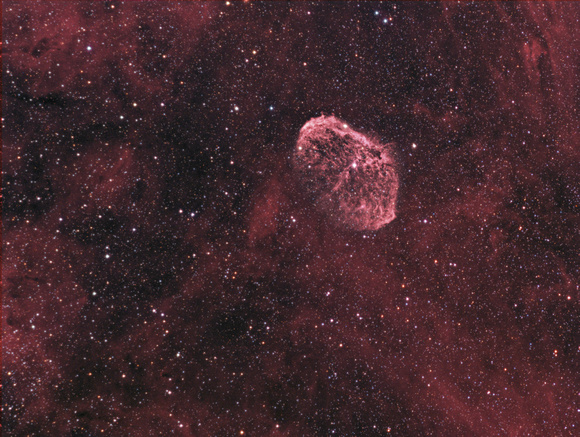APM/TMB 130/780
QSI 583WSG
Astrodon Gen 2 LRGB, Astrodon 6nm Ha
L: 12x10min (1x1)
RGB: 6x5min each (2x2)
Ha: 8x15min (1x1) added to L and R Channels
L(+Ha)R(+Ha)GB Composition, Layered multiple times with a starless, colorized Ha image
Imager Temp -10CField Flattener
Full frame
Link to Larger JPEGLink to Ha DataSky and Telescope Online Gallery August 10, 2010The Crescent Nebula (NGC 6888 or Caldwell 27) is an
emission nebula in the
Cygnus constellation, about 5000 light years away. It is formed by the fast stellar wind from the
Wolf-Rayet star WR 136 (HD 192163) colliding with and energizing the slower moving wind ejected by the star when it became a
red giant around 400,000 years ago. The result of the collision is a shell and two shock waves, one moving outward and one moving inward. The inward moving shock wave heats the stellar wind to X-ray emitting temperatures.
The nebula is actually a huge bubble about 25 light-years across. The star is shedding its outer envelope in a strong
stellar wind, ejecting the equivalent of the Sun's mass every 10,000 years. The nebula's complex structures are likely the result of this strong wind interacting with material ejected in an earlier phase. Burning fuel at a prodigious rate and
near the end of its stellar life this star should ultimately go out with a bang in a spectacular supernova explosion. Found in the nebula rich constellation Cygnus,
NGC 6888 is about 5,000 light-years away.
The "Cygnus Bubble" can be found in the lower left corner of this image. Good Luck! It can better be seen in an
Ha/OIII bicolor image of the same object in the Narrowband Gallery.
August 7, 2010


